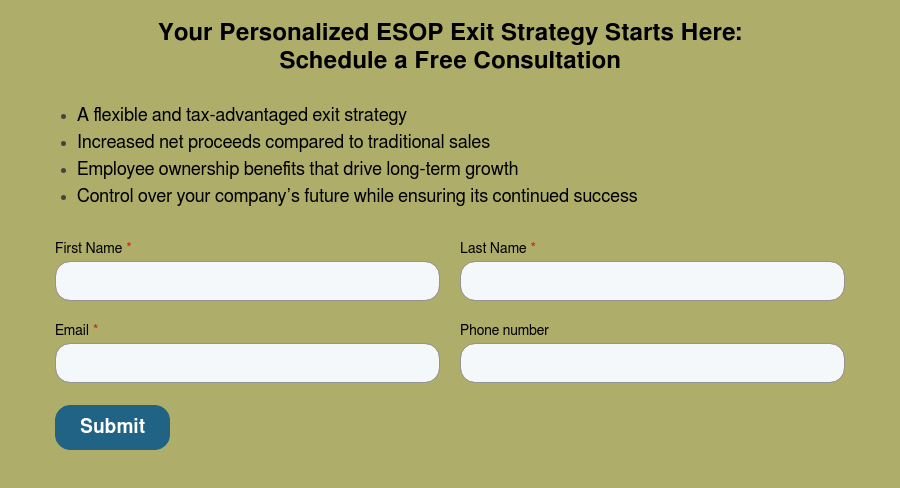An ESOP (Employee Stock Ownership Plan) is an attractive way to access personal wealth bound to the shares of your privately owned business and simultaneously distribute the wealth among the employees who helped foster the business’s growth alongside you.
As a business owner or advisor exploring this liquidity option, you may have questions about ESOPs. Here we provide the essential answers.
ESOP Explained: How Employee Stock Ownership Plans Work
ESOPs continue to gain traction in the marketplace, reflecting a broader trend of companies embracing employee ownership as a compelling and sustainable business model. There are 6,322 ESOPs (all located in the United States) with approximately 259 ESOPs installed per year.
Technically, an ESOP is a qualified, defined contribution employee benefit plan that invests primarily in the stock of the employer. Practically, however, it is a tax-advantaged way to sell all or a portion of your business to a trust for the benefit of your employees.
Why Business Owners Choose an ESOP: Key Benefits
An ESOP offers the most flexible liquidity strategy available to business owners, allowing you to specify and control the most important issues in the sale of your business.
Among other benefits, an ESOP:
- Provides for business continuity, securing the business’s—and your—legacy.
- Delivers compelling tax advantages for the company and for you as the selling shareholder.
- Allows you to choose your level of involvement in the business, transitioning management at your desired time and pace.
- Offers the gift of ownership to your employees, funded primarily by the plan’s tax advantages.
ESOP Tax Advantages: How Business Owners and Companies Benefit
A number of ESOP tax advantages may be appropriate for you and your business.
- As a Shareholder. Many third-party sales are structured as asset purchases, creating an effective blended capital gains and ordinary income tax rate to you as the seller. An ESOP sale is always a stock sale, being taxed at capital gains rates. In some instances, however, you may be able to defer the capital gains tax by reinvesting proceeds in US stocks and bonds.
- For the Company. An ESOP company can benefit from shielding significant portions (if not all) of its earnings from taxes going forward. This can increase the company’s cash flow up to the applicable tax rate. For example, if you sell 100% of the company to an ESOP, then elect S corporation status, the company’s cash flow is enhanced by 37%, due to the tax -exempt nature of the 100% S corporation ESOP.
Review more detailed information about ESOP tax advantages to discover whether an ESOP may be appropriate for your business.
ESOP Payouts: How Employees Access Their Shares
Employees who wish to access their shares have two options:
- Company employees are allocated shares over time. Typically, the number of shares each employee receives is a function of that employee’s wages. If the company’s payroll is $10,000,000 and an employee earns $100,000 annually, the employee will receive 1% of the shares allocated in that year. Shares may be allocated using a different formula so long as the formula is nondiscriminatory.
- Vesting. The ESOP plan (adopted by the company) prescribes the vesting schedule for employees. The Pension Protection Act of 2006 revised vesting to provide for three-year cliff vesting (i.e., employees are fully vested after three years but no vesting occurs prior to that) or six-year graded vesting, which must start in Year 2 and vest not less than 20% per year until 100% is reached in Year 6.
ESOP Payouts: How Employees Access Their Shares
The payout to employees depends on how they leave the company.
- Retirement. The shares in the retiring employee’s account are “put” to the company or the ESOP, meaning the company is required to repurchase the stock from the retiring employee. The value can be paid over a time frame of up to six years.
- Before retirement. The company can provide for up to a five-year pause before the six-year payout begins. This delay discourages employees from leaving the company prematurely to access the balance in their account.
How ESOP Valuation Works: Determining Fair Market Value
The ESOP is legally required to pay no more than “adequate consideration” for the shares, and a good-faith effort must be made to determine the company's fair market value. With the assistance of a valuation expert and legal advisor, the ESOP trustee negotiates the stock purchase on behalf of employees.
On behalf of the ESOP Trustee, an independent valuation expert may consider the following three methods:
- Income approach (including discounted cash-flow method and/or capitalized earnings method)
- Market approach (including the guideline public company method and/or the M&A transactions method)
- Asset approach (generally appropriate for asset-intensive companies—rarely used in ESOP valuations)
ESOP Companies: Future Options and Strategic Decisions
As your ESOP company matures, it eventually faces a critical decision about its long-term future. Two primary paths exist, each carrying distinct advantages and strategic considerations:
- Continue as an ESOP. Ideally, an ESOP can sustain employee ownership indefinitely by reinvesting profits and ensuring strong governance that fosters engagement, financial stability, and long-term value creation. This option requires careful planning to manage share repurchases and sustainability.
- Sell to a third party. Some ESOPs choose to sell to a strategic buyer or financial firm, all or partially, providing liquidity and potential growth opportunities. This can maximize shareholder value but may end employee ownership and shift company culture.
Given the complex nature of ESOPs, PCE tailors each ESOP to fit the client's specific needs. PCE also offers a “dual track” approach that, in addition to the ESOP process, includes a third-party sales strategy for considering both financial and strategic buyers. Furthermore, PCE can leverage its expertise to provide tailored advisory services for mature ESOPs, guiding them through strategic decisions to ensure long-term success.
If an ESOP sounds like an appealing succession strategy for you, contact PCE to see how we can help you achieve your goals.
Discover the ESOP Advantage – Maximize Your Exit Strategy
Selling your business is a major decision—why not choose a strategy that maximizes your proceeds, minimizes taxes, and secures your legacy?
Fill out the form below to contact our expert ESOP advisors today. Let’s discuss if an ESOP is right for you.

